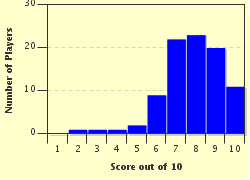Quiz Answer Key and Fun Facts
1. I'll start you off gently with this non-too-appetising recipe cooked up by three famous Shakespearean witches:
Eye of ---- and toe of frog,
Wool of bat, and tongue of dog,
Adder's fork, and blind-worm's sting,
Lizard's leg, and howlet's wing
What ingredient is missing from the bubbling cauldron?
2. England's most quoted writer brought over 2000 new words into the English language; even those who "don't do Shakespeare" will have quoted the playwright thousands of times without realising it.
Which one of these expressions is attributed to the Bard?
3. Although this expression was first used in Chaucer's 'The Merchant's Tale', it didn't become a common phrase until Shakespeare put his inimitable stamp on it. Stated by Jessica in 'The Merchant of Venice', love is... what?
4. This next ocular reference first appears in Old English in a work attributed to King Aelfred (the Great) but was used about 700 years later by Shakespeare in
'A Midsummer Night's Dream'.
What 'fruity' phrase means one's special love?
5. In one of Shakespeare's most gruesome tragedies, 'King Lear', the Earl of Gloucester has his eyes gouged out by the malicious duke, Cornwall. What macabre phrase is used to describe the unfortunate Gloucester's eyeballs?
6. One of Shakespeare's most eloquent comedies declares that love 'is first learned in a lady's eyes.' In which play, containing the characters Berowne, Longaville and Dumaine, would one hear this phrase?
7. Another phrase employed by the Bard, and commonly used today, is said when something happens very quickly. From 'The Merchant of Venice', what is this 'insightful' phrase?
8. In 'Romeo and Juliet', William Shakespeare used, for the first time in print, this word to describe a distinct eye colour named after a certain nut. Do you know what it is?
9. Back to 'A Midsummer Night's Dream', where this time it's the turn of the beautiful yet insecure character Helena to use an ocular reference.
She laments in her soliloquy that 'Love looks not with the eyes but with the...' What?
10. As this is the last question, it seems only right to finish with an eye-watering question from 'All's Well That Ends Well'.
Which everyday foodstuff, with lachrymose properties, brought the elderly character Lafeu to tears?
Source: Author
MissCirrus
This quiz was reviewed by FunTrivia editor
looney_tunes before going online.
Any errors found in FunTrivia content are routinely corrected through our feedback system.

